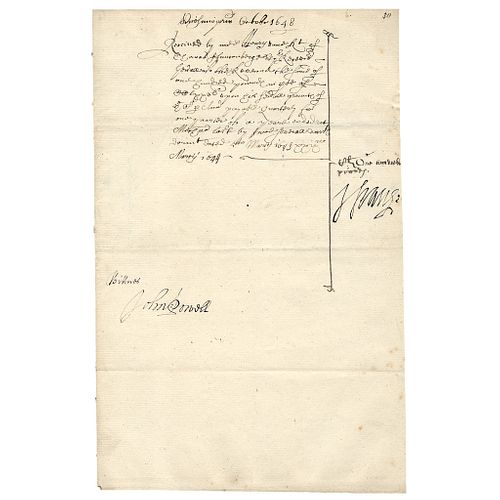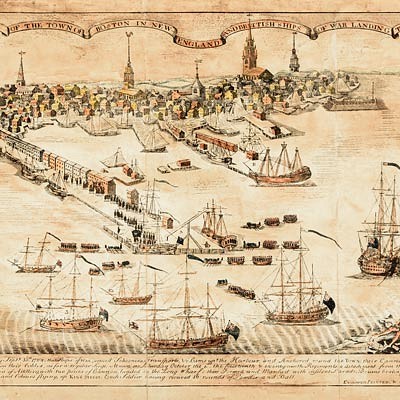1648 SIR HENRY VANE Signed Document One of Americas Earliest Colonial Governors
Lot 100
Categories
Estimate:
$600 - $800
Absentee vs Live bid
Two ways to bid:
- Leave a max absentee bid and the platform will bid on your behalf up to your maximum bid during the live auction.
- Bid live during the auction and your bids will be submitted real-time to the auctioneer.
Bid Increments
| Price | Bid Increment |
|---|---|
| $0 | $10 |
| $200 | $20 |
| $300 | $25 |
| $500 | $50 |
| $1,000 | $100 |
| $2,000 | $200 |
| $3,000 | $250 |
| $5,000 | $500 |
| $10,000 | $1,000 |
| $20,000 | $2,000 |
| $30,000 | $2,500 |
| $50,000 | $5,000 |
| $100,000 | $10,000 |
| $200,000 | $20,000 |
| $300,000 | $25,000 |
| $500,000 | $50,000 |
About Auction
By Early American History Auctions
Mar 20, 2021
Set Reminder
2021-03-20 12:00:00
2021-03-20 12:00:00
America/New_York
Bidsquare
Bidsquare : Autographs-Colonial-Political-Americana
https://www.bidsquare.com/auctions/early-american-history-auctions/autographs-colonial-political-americana-6509
330 Lots of Rare, Historic Autographs, Americana, Civil War Era, George Washington, Abraham Lincoln, Slavery & Black History, Revolutionary War Era, Colonial America, Federal Period, War of 1812, Colonial Currency, Indian Peace Medals & more... Early American History Auctions auctions@earlyamerican.com
330 Lots of Rare, Historic Autographs, Americana, Civil War Era, George Washington, Abraham Lincoln, Slavery & Black History, Revolutionary War Era, Colonial America, Federal Period, War of 1812, Colonial Currency, Indian Peace Medals & more... Early American History Auctions auctions@earlyamerican.com
- Lot Description
Colonial America
Sir Henry Vane Signed 1648 Dated Document
SIR HENRY VANE, (1613-1662). Early Colonial Governor of the Massachusetts-Bay Colony, in office 1636-1637 and supported the creation of Roger Williams' Rhode Island Colony and Harvard College, driven by a desire for religious tolerance.
October 1, 1648-Dated Colonial American Period, Manuscript Document Signed, "H Vane", 1 page, measuring 7.25" x 11.25", at Westminster (Britain), Choice Very Fine. Signed boldly in rich brown on clean laid period paper. Here, Henry Vane receives a payment. A rare Document Signed by one of America's earliest Colonial Governors, driven by a desire for religious tolerance, after his return to England, during the tumultuous period leading up to the English Revolution and Oliver Cromell's ascendancy to power. A fresh, clean document in excellent condition for display.
Sir Henry Vane (baptised 26 March 1613 - 14 June 1662), son of Henry Vane the Elder, was an English politician, statesman, and colonial governor. He was briefly present in North America, serving one term as the Governor of the Massachusetts Bay Colony, and supported the creation of Roger Williams' Rhode Island Colony and Harvard College.
A proponent of religious tolerance, he returned to England in 1637 following the Antinomian controversy that led to the banning of Anne Hutchinson from Massachusetts.
He was a leading Parliamentarian during the English Civil War and worked closely with Oliver Cromwell. He played no part in the execution of King Charles I, and refused to take oaths that expressed approval of the act. Vane served on the Council of State that functioned as the government executive during the Interregnum, but split with Cromwell over issues of governance and removed himself from power when Cromwell dissolved Parliament in 1653. He returned to power during the short-lived Commonwealth period in 1659-1660, and was arrested under orders from King Charles II following his restoration to the throne. After long debate, Vane was exempted from the Indemnity and Oblivion Act, and was thus denied amnesty granted to most people for their roles in the Civil War and Interregnum.
Although he was formally granted clemency by Charles II, he was charged with high treason by Parliament in 1662. In a court proceeding in which he was denied counsel and the opportunity to properly prepare a defence, he was convicted by a partisan jury. Charles withdrew his earlier clemency, and Vane was beheaded on Tower Hill on 14 June 1662.
Vane was recognised by his political peers as a competent administrator and a wily and persuasive negotiator and politician. His politics was driven by a desire for religious tolerance in an era when governments were used to establish official churches and suppress dissenting views.
Although his views were in a small minority, he was able to successfully build coalitions to advance his agenda. His actions were often ultimately divisive, and contributed to both the rise and downfall of the English Commonwealth. His books and pamphlets written on political and religious subjects are still analyzed today, and Vane is remembered in Massachusetts and Rhode Island as an early champion of religious freedom.
Our Auction Contents:
Black History & Slavery: (Lots 1 - 63)
Abraham Lincoln Related: (Lots 64 - 74)
Historic Autographs: (Lots 75 - 235)
Colonial America: (Lots 236 - 261)
Revolutionary War: (Lots 262 - 304)
George Washington Related: (Lots 305 - 306)
Early American Guns & Weapons: (Lots 307 - 318) - Shipping Info
-
Early American provides in-house worldwide shipping. Please contact us directly if you have questions about your specific shipping requirements.
-
- Buyer's Premium



 EUR
EUR CAD
CAD AUD
AUD GBP
GBP MXN
MXN HKD
HKD CNY
CNY MYR
MYR SEK
SEK SGD
SGD CHF
CHF THB
THB











